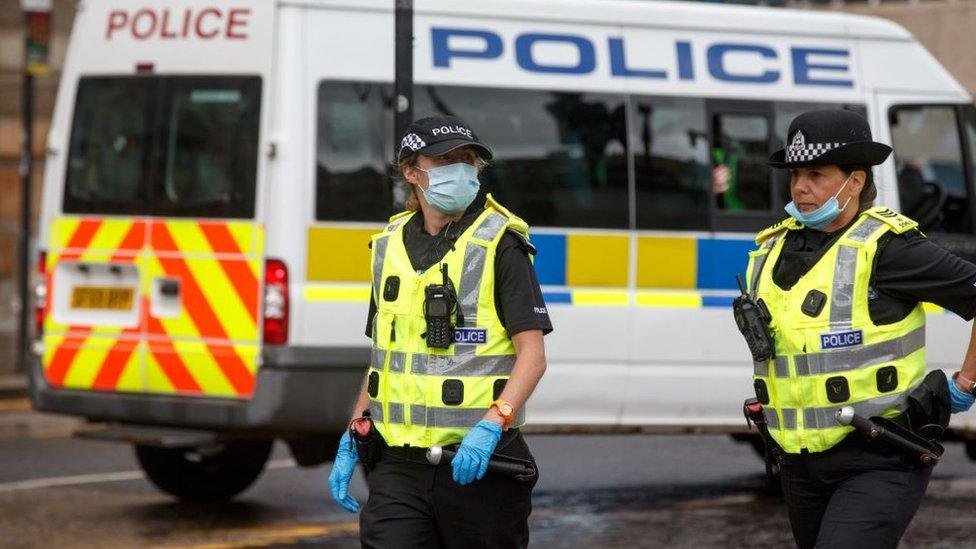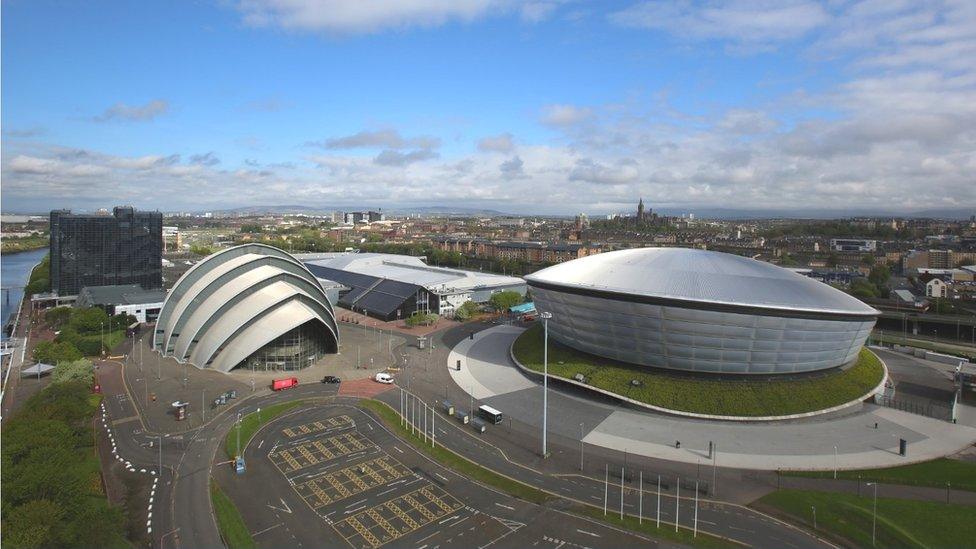Data should inform Police Scotland planning says watchdog
- Published

Police Scotland has been urged to make planning improvements ahead of COP26
Police Scotland must improve its decisions on policing by using data on demand, an inspection has found.
The police watchdog has said the force had the most "sophisticated" demand analysis in the UK, but needed to be more "proactive than reactive".
It said this was particularly important in light of COP26 and the continued policing of Covid restrictions.
Police Scotland said it would "continue to drive improvement in this important area."
The assurance review by HM Inspectorate of Constabulary in Scotland (HMICS) praised Police Scotland for its assessment of demand, but reported that there was "room for improvement" - particularly in "the forecasting of demand".
It said that pressures on the force will become more "acute" partly due to the upcoming UN climate change summit - which would inevitably disrupt day-to-day policing, according to a recent review.
About 10,000 officers from across the UK will be deployed each day during the conference in Glasgow, which is expected to attract 120 heads of state.
While officers have limited powers, there are also still legal restrictions in place to limit the spread of Covid-19, such as limits on travel and large public gatherings.
'Needs of the public'
HM chief inspector of constabulary Gill Imery said demand data and analysis were "vital" for planning resources and budget as well as creating a "sustainable model of policing".
She said: "The ultimate aim must be to ensure that public resources are deployed to best meet the needs of the public.
"Present circumstances make it all the more important for Police Scotland to equip itself with reliable and accessible information on current and future demand, assets and resources, to inform the strategic direction of the service."
The HMICS report, external, which made 12 recommendations, said the main factors hindering progress in the area of demand were limitations on the capacity of the Demand and Productivity Unit and the "lack of a delivery plan" based on the strategic and tactical needs of the organisation.
It also said there was a lack of consistency across Police Scotland in terminology and a lack of "trust and understanding" of the value of demand information.
There was "minimal evidence" that demand analysis was considered in financial and investment decision making, the report stated.
And it highlighted that staffing numbers had been an issue since the inception of Police Scotland - but that demand data would help justify how resources were used and "ensure transparency".
The force was recently criticised in the press for failing to plan for thousands of Rangers fans celebrating a title win in Glasgow despite Covid restrictions on public gatherings.
A freedom of information request by The Sunday Post, external unearthed minutes of a meeting between police, Rangers, the justice minister and the city council - it showed no alternative plans were made when a request to allow fans to celebrate inside the stadium was rejected.
Publicly police said they would not facilitate the march, but police chiefs told the meeting they would facilitate it if it went ahead, just as they had policed pro-independence and pro-Palestine protests.
A total of 47 officers were injured after a number of fans became violent during the scenes in March.
Chief Constable Iain Livingstone has previously defended the police response to the gathering as "proportionate and professional".
And a leading QC, who was asked to review how the force policed mass gatherings during the pandemic, external, found that it was necessary and proportionate.
'Hidden demand'
Ms Imery said that a "fundamental culture shift" was needed from "reactive to proactive" decision making and planning.
She said: "The inconsistencies identified speak to a lack of overall clarity about how the demand approach should be used to impact on policing delivery for the benefit of communities.
"There are still many areas of internal, hidden, unknown or unmet demand which remain a challenge to quantify and have not yet been fully identified or addressed.
"Where demand information has been used, for example in the restructuring of national tasking and co-ordinating processes, it has been beneficial and led to improvements."
Deputy Chief Constable Fiona Taylor said: "I'm grateful to HMICS for underlining the significant progress made in respect of demand analysis within policing in Scotland over recent years and we will continue to drive improvement in this important area."
- Published24 June 2021
